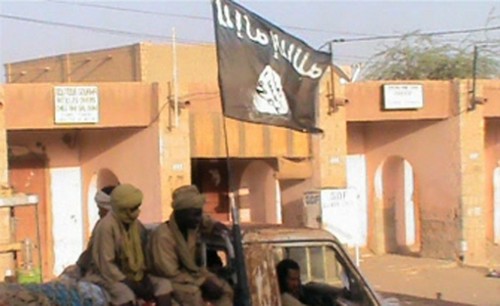
Photograph of a truck carrying members of the Islamist Ansar Dine of northern Mali. There is a black flag symbolizing their Islamic orientation flying overhead on the vehicle., a photo by Pan-African News Wire File Photos on Flickr.
France risks prolonged campaign in chaotic Mali: experts
TIM WITCHER
Last updated Saturday, Jan. 12, 2013 11:28PM EST
France’s vow to battle Islamist militants in Mali “as long as necessary” risks plunging the former colonial power into a prolonged campaign, according to diplomats and experts.
“It is getting nasty and there will be a chaotic few weeks ahead,” said a senior UN Security Council envoy after Paris officially informed the 15-member body of its decision to act in the African nation.
Al-Qaeda linked Islamist groups forced France into the conflict on Thursday by moving out of their bastion in northern Mali into government-held areas.
The militants seized northern Mali last March and have since imposed a brutal Islamic law, raising fears among Western nations that the region could become a terrorist safe haven.
France has strongly backed a proposed 3,300 African intervention force that the UN Security Council has authorized to help Mali’s army reconquer its territory.
But political turmoil in government-controlled areas, doubts about the capability of Mali’s army and the African force, as well as disputes over international funding for the operation, have all cast a shadow over the efforts.
French President Francois Hollande said his country will take on the Islamists “as long as necessary.” He has portrayed the conflict as a showdown with terrorism.
“France may now need to take an even stronger hand in the effort against the Islamists and press the rest of Europe and the United States to get more involved,” said the western envoy. Britain has already announced that it will help transport foreign troops to Mali. The United States, meanwhile, provides military training to the country.
“It may only be a limited intervention now, but there is a high chance that France will have to increase its presence further, especially if it is not possible to get a serious regional stabilization in place much faster than was planned,” said Richard Gowan of New York University’s Center on International Cooperation.
“It’s likely that France and possibly the United States will escalate special forces raids and drone strikes in the north to weaken the Islamists while some sort of long-term intervention force gets together,” Gowan added.
The Islamists and allied Tuareg separatist rebels took advantage of a coup in Mali to seize the huge chunk of territory. The coup leaders continual dabbling in politics has hindered international efforts to bolster the campaign against the Islamists, diplomats said.
France and its allies had planned to spend the first few months of 2013 rebuilding the Malian army torn apart by the coup. Officials had predicted that no offensive could start before September.
In parallel, the international community would seek to strengthen the transitional government and pursue efforts to persuade the Tuaregs and other rebels to turn against Al-Qaeda in the Islamic Maghreb and its allies.
But Mali’s coup leaders have retained a strong influence over the interim government that took over last year. One prime minister was forced out in December and diplomats say coup leader, Captain Amadou Haya Sanogo, has also sought to kick out interim president Dioncounda Traore.
Mali’s army melted away when the Islamists launched their new advance this week – and this worries many countries.
US UN Ambassador Susan Rice raised concerns about Mali’s army at an emergency Security Council meeting on Thursday.
“One of the things we discussed is the extent to which the Malians are ready and willing to defend their own country,” Rice said afterwards.
France has urged a faster deployment of the Economic Community of West African States (ECOWAS) troops into Mali. So far Burkina Faso, Niger and Senegal have each pledged 500 troops.
“If ECOWAS cannot deploy enough troops quickly enough, there’s a high chance that France might turn back to the Security Council and ask for a UN mission in southern Mali, although the UN might also struggle to deploy fast,” said NYU’s Gowan.
France’s former conservative prime minister Dominique de Villepin predicted problems ahead.
“We will be fighting alone because there is no solid Malian partner,” he wrote in a commentary published Sunday that also questioned the offensive’s motive.
“The collapse of a divided Malian army, the general breakdown of the state: who will we rely on?” Villepin wrote in the Journal du Dimanche newspaper.
1 comment:
target - Algeria
Post a Comment